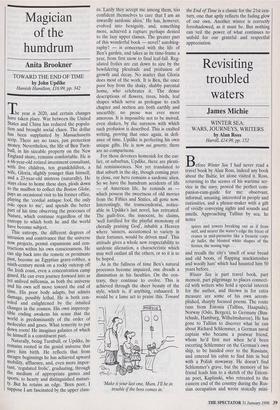Magician of the humdrum
Anita Brookner
TOWARD THE END OF TIME by John Updike Hamish Hamilton, £16.99, pp. 342 he year is 2020, and certain changes have taken place. War between the United States and China has reduced the popula- tion and brought social chaos. The dollar has been supplanted by Massachusetts scrip. There are no taxes, just protection money. Nevertheless, the life of Ben Turn- bull, in his sizeable property on the New England shore, remains comfortable. He is a 66-year-old retired investment consultant, With five children, ten grandchildren, a Wife, Gloria, slightly younger than himself, and a 23-year-old mistress (naturally). He stays close to home these days, plods down to the mailbox to collect the Boston Globe, Pays an occasional visit to his former office, Playing the 'cordial antique fool, the only role open to me', and spends the better part of his time observing the processes of Nature, which continue regardless of the entropy to which both he and the world have become subject.
. This entropy, the different degrees of intrusion and contrivance that the universe now projects, permit expansions and con- tractions within his own consciousness. He Can slip back into the remote or proximate Past, become an Egyptian grave-robber, a ninth-century monk on a rocky outcrop off the Irish coast, even a concentration camp guard. He can even journey forward into as Yet unlived millennia, as both the universe and his own self move toward the end of time. His poor body adapts, but admits damage, possibly lethal. He is both con- soled and enlightened by the intuited Changes in the cosmos. His own impercep- tible ending awakens his sense that the World is predominantly of the order of molecules and gases. What temerity to put down roots! He imagines galaxies of which he himself is a constituent part. Naturally, being Turnbull, or Updike, he remains rooted in the genial universe that gave him birth. He reflects that from Meagre beginnings he has achieved upward mobility, affluence, and, even more impor- tant, 'regulated frolic', graduating, through the medium of appropriate games and Sports, to hearty and distinguished maturi- rY. But he retains an edge. 'Born poor, I suppose I am fascinated by the upper class- es. Lazily they accept me among them, to.o confident themselves to care that I am an inwardly sardonic alien.' He has, however, evolved into benignity, and, something more, achieved a rapture perhaps denied to the lazy upper classes. The greater part of this wonderful book — novel? autobiog- raphy? — is concerned with the life of Ben's garden, and takes as its time-frame a year, from first snow to final leaf-fall. Reg- ulated frolics are cut down to size by the bewildering plenitude and profusion of growth and decay. No matter that Gloria does most of the work. It is Ben, the once poor boy from the shaky, shabby parental home, who celebrates it. The dense descriptions of flowers, trees, birds, leaf shapes which serve as prologue to each chapter and section are both earthly and unearthly; no prose was ever more amorous. It is impossible not to be moved, even shaken, by the sureness with which such profusion is described. This is exalted writing, proving that once again, in defi- ance of time, Updike is perfecting his own unique gifts. He is now sui generis; there are no comparisons.
For those devotees homesick for the ear- lier, or suburban, Updike, there are plenti- ful reminiscences. Not yet translated to that suburb in the sky, though coming pret- ty close, our hero remains a sardonic alien. So we have the humdrum accidents of life — of American life, he reminds us — which possess the sweetness of old movies from the Fifties and Sixties, all gone now. Interestingly, the transcendental, notice- able in Updike's last novel, has retreated. The guilt-free, the innocent, he claims, 'well fortified for the playful monotony of chorally praising God', inhabit a Heaven where 'sinners, accustomed to variety in their fortunes, would be driven mad'. This attitude gives a whole new respectability to sardonic alienation, a characteristic which may well outlast all the others, or so it is to be hoped.
As in the fullness of time Ben's natural processes become impaired, one dreads a diminution in his faculties. On the con- trary, they continue to evolve. This is achieved through the sheer beauty of the style, which is, if anything, enhanced. It would be a lame act to praise this. Toward 'Make it your last one, Mum. I'll be in trouble if the boss comes in.' the End of Time is a classic for the 21st cen- tury, one that aptly reflects the fading glow of our own. Another winter is correctly foreshadowed, as it must be. But nothing can veil the power of what continues to unfold for our grateful and respectful appreciation.


































































 Previous page
Previous page